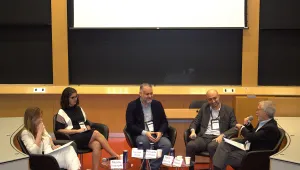BCSIA: 1999-2000 ANNUAL REPORT
1. Director''s Foreword
As we enter the new millenium the Robert and Renée Belfer Center for Science and International Affairs (BCSIA) faces both new and familiar challenges and opportunities. Our key challenge, as always, is to be the vital hub of the John F. Kennedy School''s research, teaching, and training in international security affairs, environmental and resource issues, and science and technology policy. Dynamic developments in each of these areas challenge us as we seek to provide both the academic and policy communities with timely and policy-relevant knowledge.
The 1999-2000 academic year saw the first democratic transfer of power in Russia as well as the heat and passion of our own presidential election. It saw bold steps toward peace in the Middle East, and sharp increase in violence. On the environmental front, as "global warming" has increasingly been recognized, the successful formula for global reductions in carbon emissions appears even more elusive. The speed of advancement of information technology continues to astound even its strongest advocates. Biotechnology likewise raises both hope and fear as researchers handle the very substances of life in plants, animals, and ourselves.
BCSIA has sought to lead in advancing policy relevant knowledge about these issues. The Strengthening Democratic Institutions Project shed light on the Russian elections through its acclaimed "Russia Watch" publications. With Shai Feldman and our partners at the Jaffee Center in Tel Aviv we have been addressing volatile issues of Middle East security. The Global Environmental Assessment group continues to play a critical and growing role in informing U.S. policy. Our Harvard Information Infrastructure Program continues to grow in size and reputation as a critical locus for debate about information technology and public policy. Finally, Calestous Juma and others have taken unified steps in defining an agenda.
We have also continued to grow in both numbers and scope. The number of affiliated faculty, staff, and research fellows now numbers 150. Our colleagues often ask us when we plan on stopping the growth. In truth my answer is when we stop finding exciting new opportunities for intellectual inquiry, when we stop having applications from the most talented and motivated young researchers, and when we decide that the policy relevant advice we strive to offer in all of our endeavors is no longer of importance to our university and our nation. Not soon!
Key accomplishments for the year include:
· Our own election campaign was better informed and our future leadership well served when both the Bush and Gore teams selected key foreign policy leadership advisors from within BCSIA. AMB Bob Blackwill and Robert Zoellick served on Governor Bush''s team of "Vulcans," while Graham Allison and Ash Carter were key members of the team advising Vice President Gore.· We succeeded in achieving Greg Carr''s goal of transitioning the new Carr Center for Human Rights from a component program of BCSIA to a stand-alone entity, which as of July of 2000 became a fully independent sibling center. Simultaneously we welcomed into our family the World Peace Foundation Program on Intrastate Conflict, Conflict Prevention, and Conflict Resolution as a fifth pillar in our program structure.· We have continued to communicate our ideas and to offer advice to policy-makers through our extensive publication program. Among the most significant in this academic year are the National Academy of Science Study group co-chaired by William Clark''s "Our Common Journey: A Transition toward Sustainability;" from John Holdren and the President''s Council of Advisors on Science and Technology "Power of Partnerships: The Federal Role in International Cooperation in Energy Innovation;" from Matt Bunn ""The Next Wave: Urgently Needed New Steps to control Warheads and Fissile Materials;" and Robert Rotberg''s "The Scourge of Small Arms." Of course, our journal International Security remains the premier journal in its class.· The quality of our team is reflected in the continuing individual recognition for excellence of Center personnel. Premier examples from the past year are John Holdren''s prestigious 2000 Tyler Prize for environmental work, and Bill Clark''s Teaching Award recognition by the KSG Class of 2000.· Our effort to contribute to public policy is seen in the following chapters in regard to our work with the Department of State, the Department of Energy, and the Department of Justice. In the latter case, under the leadership of Rich Falkenrath our Executive Session on Domestic Preparedness is off to a dynamic start and having a profound influence on Federal, state, and local policies and practices.
I encourage you to carefully review the following sections, which spell out in more detail the exceptional work being accomplished here in many diverse areas. I am especially pleased by our program''s success in building bridges of cooperation throughout the university and ties with other prominent U.S. and foreign research centers and institutions of higher education.
As our community has grown, we rely increasingly on our integrated complex of web pages for the Center and our programs to keep our friends abreast of our latest achievements and issues of inquiry. Please join us on line at www.ksg.harvard.edu/bcsia. We are eager to hear your reactions to our programs and your about ways we can improve in the future.
Table of Contents:
Environment and Natural Resources ProgramInternational Security Program Science, Technology, and Public Policy Program Strengthening Democratic Institutions Project WPF Program on Intrastate Conflict, Conflict Prevention, and Conflict Resolution BCSIA Events BCSIA Publications Biographies



